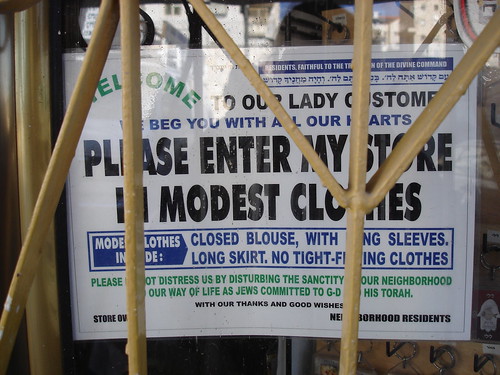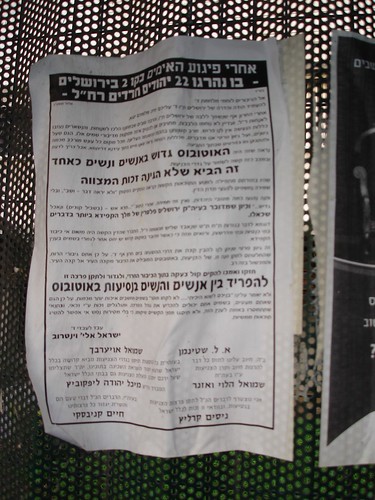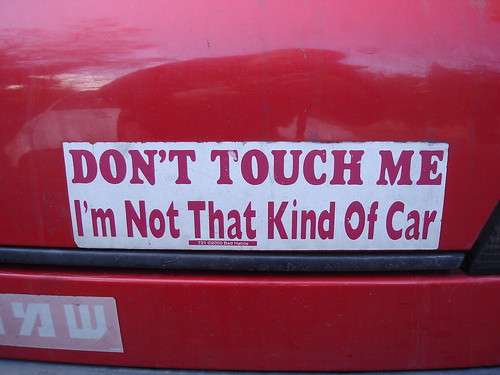Peer Pressure of a Different Kind
Last Friday, I was in Givat Shaul, a Haredi neighborhood. Here are several things that I saw there.
First, a sign in English asking women to enter a particular establishment only in modest dress:
I can’t help wondering what kind of pressure was exerted on the proprietor to put this sign on his door. I don’t get to Givat Shaul very often, but the last time I was there—a few months ago—I didn’t see this sign. I’ve also seen them in Geula, in Hebrew. This appears to be a recent development. This is the first time I’m seeing such signs in stores or on their doors, and I’ve been here a long time.
To me, the signs are not a polite request but rather a veiled threat. I translate them as follows: “Dress as we tell you to, down to the smallest detail, or we won’t be responsible for what we do.”
(Fine observance of Halakhah, that.)
Now, an outright scare tactic. On this bus station is a printed sign stating that the reason that a No. 2 bus was blown up some years ago was because the passengers were not careful to sit separately. Therefore, the sign says, the power of the mitzvah did not protect the passengers.
Next to it was this sign:
Here is my translation, with commentary:
Think before you sit. [The verbs are in the plural, present tense, rather than in the imperative, so that the sign can also be read: We think before we sit. In any case, the idea here is to soften the imperative tone and to give a feeling of in-group, of community, as in: This is what we do.]
Before we board the bus, we think about the most important thing: where to sit?
We all obey the instructions of the great sages of Israel!
Men: in the forward portion
Women: in the inner portion.
Notice that the sign says “inner portion” rather than “rear portion.” In my opinion, that is nothing but a lame attempt to disguise what the sign is really saying:
“Women to the back of the bus!”
After I boarded the bus that I had been waiting for, I found myself wondering what it must be like to grow up in these neighborhoods, bombarded with these messages day after day, week after week, year after year. I came to Jewish observance as a young adult after having had plenty of interaction with the world around me. I had tools for critical thinking and discernment. I also know plenty of older observant Jews who never had to deal with anything like this, and who are as distressed by it as I am.
When I was a child and young adult, I prided myself on my ability to resist peer pressure. (Yes, I was stubborn. Still am.) But usually, peer pressure is pressure to do something that, in one way or another, is not OK.
This is peer pressure taken to the other extreme: to be, as some see it, better and better and better. In a religious community, where the residents have a sincere desire to do God’s will—or, at least, know that they had better show such a desire to their neighbors and friends even if they might not feel it themselves—who can resist this sort of thing? Where will it end? And how will it affect all the people who are growing up in this generation, both now and later on?
Finally, for a bit of comic relief:
“Don’t touch me,” the bumper sticker says. “I’m not that kind of car.”
(Click on any photo in order to see a larger version.)




No comments:
Post a Comment
Comments are moderated. If you're a spammer, don't waste your keystrokes. If you're a real, honest-to-goodness commenter, welcome!